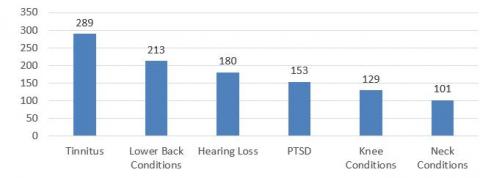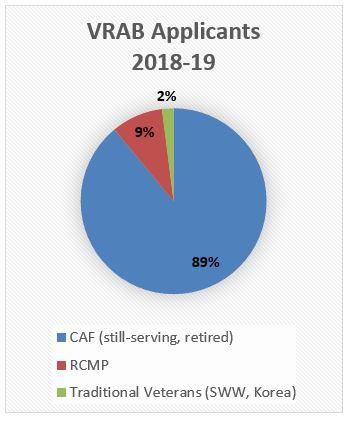Transition Binder
Your right to be heard
What we do for Veterans
- Ensure that Canada’s Veterans receive the disability benefits to which they are entitled
- Provide timely, respectful and Veteran centric hearings
- Deliver fair, plain-language, and timely decisions with well explained reasons
Our Organization
- Quasi-judicial administrative tribunal led by Chair (Deputy /Head), supported by Deputy Chair, that operates independently of the Minister and/or Veterans Affairs Canada
- Reports directly to Parliament through the Minister
- Up to 25 Board Members, appointed by the Governor in Council through a merit-based selection process, hear and decide cases across Canada
- 75 employees in Charlottetown support the delivery of the appeal process
Member Overview
- There are currently 17 full-time permanent Board Members (10 women and 7 men), including the Chair and Deputy Chair
- 8 Board Members work in Charlottetown and 9 are deployed across Canada
- 8 Board Members are fluent in both of Canada’s official languages
- Board Members have varied professional experiences
- 7 Veterans (4 CAF and 3 RCMP), 1 former police officer, 8 lawyers
- Other backgrounds include Public Service
- Board Members receive ongoing professional development, as well as cultural awareness sessions from CAF and RCMP about life in service
Member Appointment Process
- Applicants are screened and assessed against merit-based criteria:
- Written assessment, interviews and reference checks
- A roster of qualified candidates is established and recommended to the Minister of Veterans Affairs
- The Board Chair advises the Minister of appointment needs in terms of operational requirements, location, language, gender, diversity and experience
- Minister recommends candidate for appointment by the Governor in Council
- High priority is being placed on appointments to ensure there is a sufficient compliment of Members to provide timely hearings and decisions
Guiding Legislation
- Applications for appeal are made to VRAB under the Pension Act, the Veterans Well-being Act - Part 3, the War Veterans Allowance Act and other Acts of Parliament.
- All matters related to appeals are authorized under the Veterans Review and Appeal Board Act.
- VRAB also receives appeal applications for on duty-related pension cases made under the Royal Canadian Mounted Police Pension Continuation Act and the Royal Canadian Mounted Police Superannuation Act.
Avenue for Redress
- VRAB provides an independent avenue of appeal for VAC decisions relating to:
- Disability pensions
- Disability awards (Pain and Suffering Compensation April 1/19)
- Additional Pain and Suffering Compensation (April 1/19)
- Critical Injury Benefit
- Special awards
- Final appeals for War Veterans Allowance
- Compassionate awards
Applications to VRAB
- Veterans come to VRAB because they are dissatisfied with departmental decisions
- 75% of cases are for new/increased entitlement
- 25% of cases are for assessment increases
- Top 6 medical conditions in 2018-19:
Text Version
The image is a bar graph. It shows the top six medical conditions the Veterans Review and Appeal Board received applications for in 2018-19.
During the 2018-19 fiscal year, the Veterans Review and Appeal Board received 289 applications for tinnitus; 213 applications for lower back conditions; 180 applications for hearing loss; 153 applications for post traumatic stress disorder; 129 applications for knee conditions; and, 101 applications for neck conditions.
Our Workload in Context
| Fiscal Year | VAC decisions* | VRAB Review decisions | As a % of VAC's previous year decisions |
|---|---|---|---|
| 2018-19 | 41,782 | 1,407 | 3.9% |
| 2017-18 | 35,949 | 2,017 | 5.5% |
| 2016-17 | 36,502 | 2,219 | 6.0% |
| 2015-16 | 37,004 | 2,507 | 8.5% |
| 2014-15 | 29,480 | 2,729 | 8.3% |
*VAC decisions with appeal rights to VRAB, i.e. first applications, medical reassessments, and departmental reviews
* Changes in VAC legislation, policies and approaches have led to Veterans receiving more favourable decisions at the Departmental level, which is decreasing the number of VRAB cases
Text Version
The image consists of a pie chart displaying that 89 percent of applicants were Canadian Armed Forces (still serving, retired), 9 percent of applicants were Royal Canadian Mounted Police and 2 percent of applicants were Traditional Veterans (Second World War, Korea).
Our Decisions (2018-19)
- Volume:
- 1,407 Review decisions and 567 Appeal decisions
- Increased favourability rates (i.e. decision to award new/increased benefits):
- Ability to rule favourably often due to:
- New evidence (e.g. Testimony, medical opinions)
- Arguments by representative
- Application of benefit of the doubt
- Ability to rule favourably often due to:
| 2018-19 | 2017-18 | |
|---|---|---|
| Review | 59% of decisions ↑ | 44% of decisions |
| Appeal | 42% of decisions ↑ | 29% of decisions |
Hearing Process
- Veterans have the right to two levels of redress if they are dissatisfied with a VAC decision: a Review hearing and an Appeal hearing
- No time limits placed on these rights
- Fresh new look at application and new evidence
- Informal hearings - no one opposes the Veterans
- All Veterans have access to free representation by the Bureau of Pension Advocates
- Some Veterans’ organizations, such as the Royal Canadian Legion, also offer advice and representation
- Veterans can bring witnesses and/or support person(s) with them
- Most favourable interpretation of the law stands – Benefit of the Doubt
Review Hearing
- Veterans only opportunity to present oral testimony and share their stories
- Represented by Advocates with two Board Members conducting hearings across Canada where Veterans are present
- Veterans are sworn/affirmed before the hearing starts
- Board Members explain the Hearing process
- Board Members may ask questions to better understand the case
- Non oppositional process, with only one Member needed to make a favourable decision
Appeal Hearing
- If Veteran is not satisfied with the Review decision, an Appeal Hearing is another opportunity to provide evidence and arguments through a representative to a new panel of three Board Members
- Held in Charlottetown by video or teleconference
- No oral testimony from Veteran
- Opportunity for Veterans to have a reconsideration hearing(s) if there is an error of fact or law, or new evidence is established
- Veterans have the right to apply for a judicial review under the Federal Courts Act if all appeal options have been exhausted
Evidence
- Health Evidence
- Health documentation (e.g. Medical exams and surgery reports)
- Expert opinions (e.g. Report on the status and origins of the disability)
- Documentary Evidence
- Service records
- Witness Statement(s)
- Opportunity to confirm circumstances helpful to describe incidents
- Testimony
- Personal testimony provided at the review hearing that describes the disability, incident or military service
- New evidence that Veterans Affairs Canada did not have
Positive Feedback: Review Hearing
- Established review hearing exit survey in 2013-14
- Goal: authentic feedback about hearing experience
- In 2018-19, 558 responses received (about 41% of Veterans)
- Overwhelmingly positive feedback:
- 98% said Board Members treated them with respect
- 96% said Board Members listened to what they had to say
- 91% said their hearing was conducted in a fair manner
- Ongoing exit survey for feedback to guide improvements
- Results continue to be positive and informative

